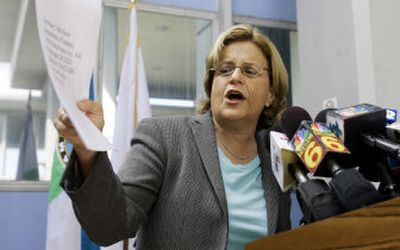Temporary asylums extended

WASHINGTON – The Bush administration has decided to grant a one-year extension of temporary permits allowing about 300,000 Salvadoran, Nicaraguan and Honduran immigrants to remain legally in the United States, officials said Wednesday night.
The decision on whether to extend the program, known as Temporary Protected Status, had been hotly debated in the federal bureaucracy.
The official announcement of the one-year extension is expected Friday, when Salvadoran President Elias Antonio Saca is scheduled to visit Washington, officials said. But word leaked out Wednesday when Rep. Ileana Ros-Lehtinen, R-Fla., said the White House had given her advance notice.
In a news release, she said she was pleased to learn of the decision. “This extension to Nicaraguans, Hondurans and Salvadorians will provide much needed relief to these individuals,” Ros-Lehtinen said, adding that it would also “assure regional stability in our hemisphere.”
Department of Homeland Security spokesmen declined to confirm Ros-Lehtinen’s announcement. One U.S. official briefed on the matter said, “It’s definitely correct.”
About 80,000 Hondurans and 4,000 Nicaraguans hold temporary permits that are scheduled to expire in July. They were initially provided after Hurricane Mitch in 1998 and renewed several times. About 220,000 Salvadorans also have permits, granted because of a pair of earthquakes that devastated their country in 2001. The permits expire in September.
Temporary Protected Status is designed to help immigrants who have difficulty returning to their homelands because of natural disaster or war.
The program is controversial, with advocates of tighter immigration controls arguing that the beneficiaries are allowed to stay long after the crises have abated back home. Many of the immigrants arrived in the United States illegally.